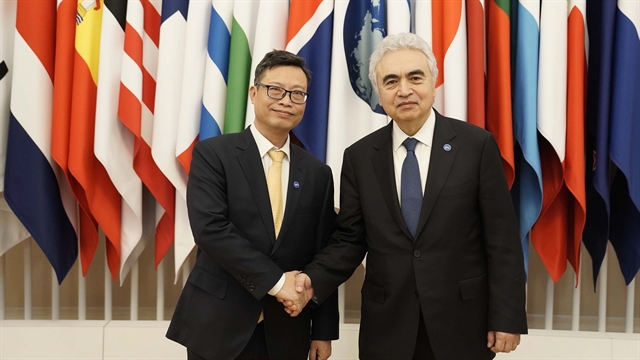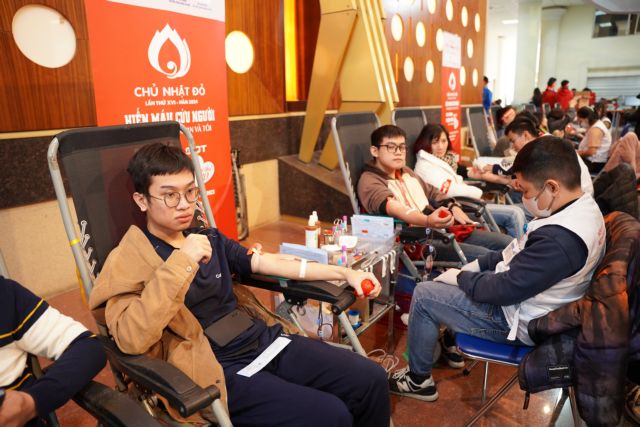 Society
Society

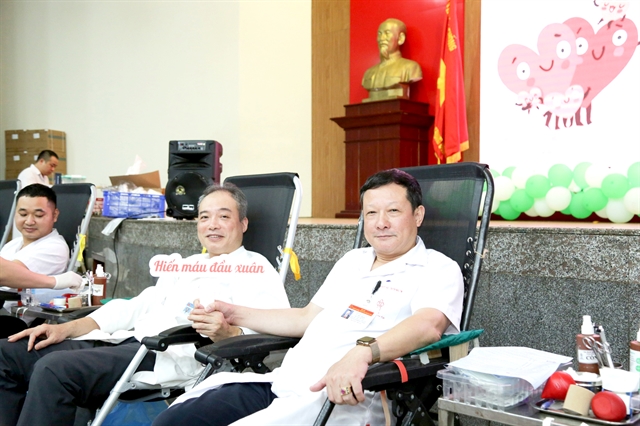 |
| Vũ Đức Bình, deputy director of the National Institute of Haematology and Blood Transfusion (right),takes part in a blood donation event at the institute. Photo courtesy of the National Institute of Haematology and Blood Transfusion |
Nam Đông & Thiên Lam
HÀ NỘI — Vũ Đức Bình, a doctor with 20 years of experience in haematology at the National Institute of Hematology and Blood Transfusion, said that personalised treatment regimens and a positive mindset are two key factors enabling patients with malignant blood disorders to combat their disease.
He highlighted the crucial role of doctors in strengthening patients' mental resilience, helping them confidently endure and cooperate with treatments, thereby increasing recovery rates.
"I always tell my patients not to panic or worry excessively, when diagnosed with cancer. Cancer is not the end of the road. It’s simply a shift in the body to a new state that adapts to cancer treatment," he told Nhân Dân newspaper.
Over the past two decades, Bình has become a notable figure on the institute's social media pages, sharing knowledge about haematological diseases and instilling trust in the hospital's treatment protocols.
Beyond his managerial duties at the hospital, he and his colleagues dedicate time to writing care guidelines for patients with conditions such as lymphoma, multiple myeloma, thalassemia and other blood disorders.
He also participates in teaching and training, supporting haematology and oncology departments in hospitals with updates on diagnostics and treatment approaches for these conditions.
Bình recalled that after six years studying general medicine at the Military Medical Academy, he specialised in haematology and began his career at Việt Nam-Soviet Friendship Hospital. Shortly thereafter, in 2004, he joined the National Institute of Haematology and Blood Transfusion, where he has remained ever since.
Through the highs and lows of his career in haematology, he and his colleagues have achieved remarkable advancements in treatment techniques for patients with blood diseases.
In the 2000s, haematological disorders were largely underdiagnosed and lacked effective treatment protocols. For patients with severe prognoses, life expectancy was extremely short. Many leukaemia patients, for example, survived only weeks or months.
However, with advancements in mutation diagnostics and the introduction of targeted gene therapy drugs, many patients have been nearly fully cured and returned to normal lives.
A range of targeted drugs has been developed to treat cancers and haematological conditions, significantly prolonging the lives of patients with cancers such as breast, liver, non-small cell lung and blood cancers. In many cases, the disease becomes undetectable during routine check-ups.
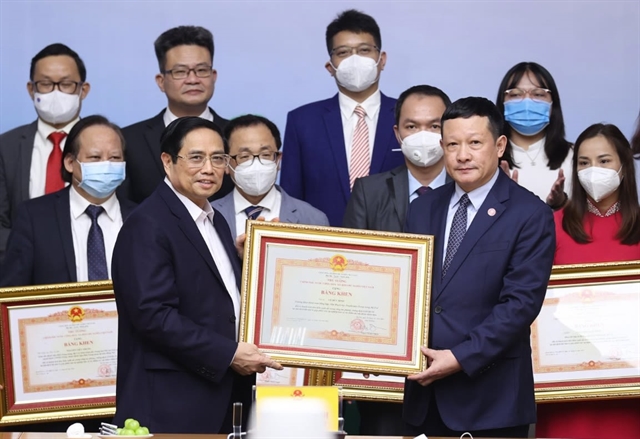 |
| Dr Bình receives a certificate of merit from Prime Minister Phạm Minh Chính for his dedicated efforts in treating patients at the COVID-19 Intensive Care Hospital in Thủ Đức District, HCM City. |
The shift from chemotherapy to biotherapy has been transformative, leading to numerous cases of complete remission.
Bình explained that previously, chemotherapy was the primary option for patients with malignant blood disorders, but it came with severe side effects, poor responses in some patients and high early mortality rates.
With groundbreaking scientific and technological advancements, targeted drugs now precisely attack cancer cells, reduce chemotherapy's side effects and achieve higher treatment efficacy.
For certain blood disorders, doctors have successfully sequenced genes and identified mutations associated with these diseases. This enables better prognoses and the selection of appropriate treatment regimens, significantly improving patients’ survival times.
For instance, patients with multiple myeloma can now extend their life expectancy from three years to up to ten years.
“To date, the institute has performed over 650 stem cell transplants, truly saving patients' lives. Thanks to these achievements, patients no longer need to go abroad for treatment,” he said.
Particularly memorable cases
He enthusiastically recounted a particularly memorable case from three years ago involving a young man in his 30s. The patient suddenly became paralysed in both legs due to a spinal tumour and had undergone surgery at a surgical hospital.
However, his condition did not improve, and he was later diagnosed with leukaemia, leaving him feeling that his future was bleak. After undergoing specialised blood tests at the institute, he was correctly diagnosed with multiple myeloma and immediately began treatment.
The young man’s life took a remarkable turn as he fully regained the use of his legs.
“If the disease hadn’t been accurately diagnosed, the patient would have remained paralysed for life or even died from complications,” Bình said.
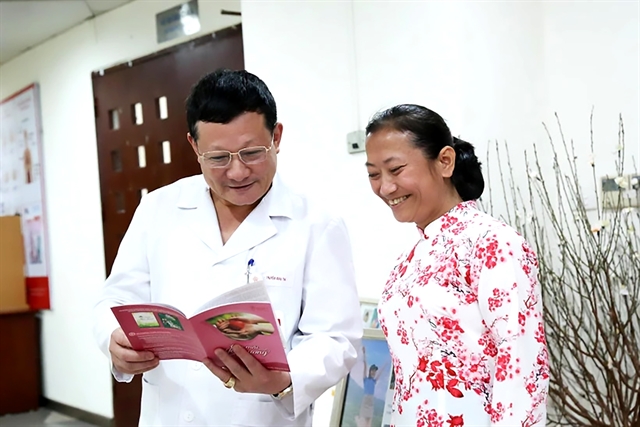 |
| Dr Bình with Nguyễn Thị Vinh, a lymphoma patient currently in remission, at the institute. VNA/VNS Photo |
However, not all cases have successful outcomes.
Bình recalled the devastated faces of a poor family when their child, born in 2007, was screened for thalassemia and found to have acute leukaemia in the northern mountainous province of Hà Giang a year ago.
At that time, the 12-year-old child showed no clinical symptoms, but test results confirmed acute leukaemia.
The family, struggling with poverty, could do nothing but cry silently together. The medical team immediately informed the provincial Health Department and the family, transporting the child to Hà Nội for specialised diagnostics and chemotherapy treatment.
“We tried everything we could, but the child didn’t survive,” he said sorrowfully.
During the peak of the COVID-19 pandemic in HCM City, Bình volunteered to work on the frontlines, spending 45 days providing care to patients at the COVID-19 Intensive Care Hospital in Thủ Đức District.
"During that period, many COVID-19 patients experienced severe blood clotting disorders, so as haematologists, we focused all our efforts on consulting and managing these critical cases," he recalled.
Dedicated to the Department of General Haematological Diseases, Bình has directly treated patients with various blood disorders, particularly those with multiple myeloma, lymphoma, myelodysplastic syndromes and myeloproliferative disorders.
Many of his patients regard him as a father or uncle figure due to his compassionate care and dedication to their treatment.
Currently, Bình and his colleagues are working closely with the National Institutes of Health (NIH) to introduce CAR-T therapy to Việt Nam. This cutting-edge treatment, being researched and applied globally, is considered the last-resort method for treating malignant blood disorders in patients who have failed previous therapies.
Given the high costs and technical complexities of CAR-T therapy, Bình expressed hope that within three years, the institute will be able to master and implement this life-saving technique.
“Two to three years is a very tight timeline, but we are determined to bring this therapy to our patients as soon as possible. This method involves collecting T cells from the patient’s blood, modifying and culturing them to recognise and attack cancer cells effectively.
“My deepest hope is that the Ministry of Health and Vietnam Social Insurance will create policies to make these new, expensive cancer treatments accessible to patients so they can extend their lives," he said. — VNS



